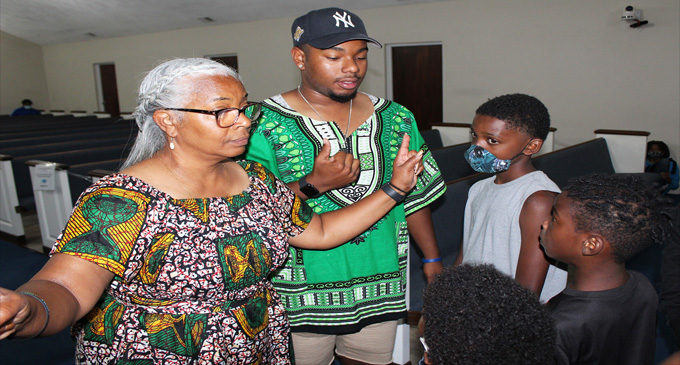T.U.R.N.’s Freedom School empowers youth through theatre
Royal Curtain Drama Guild’s director, Stephanie Hurt, and her son, guild choreographer Joel Hurt, work with youth in the Freedom School at Calvary Hill Church of Greater Deliverance.

By John Railey
The sanctuary abounded with energy, the smiling youth dancing and chanting as one: “I can make a difference in myself, in my family, in my community, in my country, in my world with hope, education and action.”
They were the 40 students taking part in a Freedom School, a culturally based literacy program sponsored by T.U.R.N. (Through Unity Reformation is N-Evitable) at Calvary Hill Church of Greater Deliverance in Winston-Salem. The effort has helped youth retain their progress in reading during the summer break from school.
This summer, the Royal Curtain Drama Guild (RCDG) took part, bringing the fun power of the arts. RCDG, led by founding director Stephanie Hurt and supported by Winston-Salem State University’s Center for the Study of Economic Mobility (CSEM), draws from the abundance of talent in East Winston and other areas of the city, employing residents of all ages as actors and crew on a contract basis and putting on plays as an economic development effort.
CSEM Associate Director Alvin Atkinson said, “The arts can play an important role in the development of protective factors such as self-confidence and self-esteem that help youth navigate pathways to overcome the conditions of poverty for themselves and their families, who can support and take pride in their accomplishments.”
On a recent day in the church sanctuary, Stephanie Hurt and her son, Joel, RCDG’s choreographer, led the students as they rehearsed for a musical, the finale of the Freedom School. “I have to wake up so my future can see the best that I can be,” they chanted as they marched around the big room.
In preparation for that musical number, Stephanie Hurt had asked the youth what they wanted to be when they grow up. The choices ranged from one boy first saying he wanted to be a basketball player, then changing his choice to math teacher, to a girl saying she wanted to be an architect. Taking a cue from Whoopie Goldberg in “Sister Act 2,” Hurt then told the youth they needed “to wake up because now is the time to start seeing what it is you want to be.”
Hurt said it was a great way to get the youth focused on working hard in school to achieve their dreams. “They get to tell their dreams to their parents,” she said. “Some of them have never told their parents what they want to be.”
In the musical program, the students sang their individual career choices, saying they wanted to be the best at them. Hurt said this helps the students “with their skill of memory, their understanding. If they can sing it, they can embed it. You get to learn the lines, you get to put a feeling with the lines. It makes it more believable for them. Standing before people is not an easy task for a lot of individuals. The beautiful thing about Freedom School is they’re all doing it together, drawing strength from each other.”
Carrie Woods, the founder and executive director of T.U.R.N, said one young scholar was very shy, most comfortable reading alone. “Performing helped pull that inner strength out of her,” she said.
Freedom School is for K-8th grade students. Woods said RCDG fits with T.U.R.N’s work. “If we can come together as a community, reform has to happen,” she said.
RCDG had worked with youth in the T.U.R.N. program a few years ago, but this was its first venture with the Freedom School. It plans to return next summer. Meanwhile, some of the youth from this summer’s program plan to take part in RCDG’s plays. “We lean into the community to bring in the players of all ages that can bring the plays to life,” Hurt said. “We introduce those who have never done performing to the arts.”
John Railey (raileyjb@gmail.com) is the writer-in-residence for CSEM, www.wssu.edu/csem.









